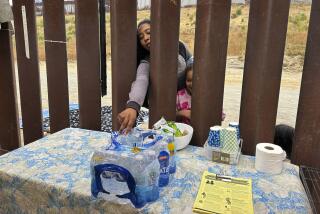Migrant Policy Just a Start
- Share via
When President Bush called upon Congress this week to craft a new immigration law, he asked that it consider four principles: controlling the border, serving the nation’s economic needs, denying blanket amnesty and providing incentives for guest workers to return home once their employment contracts expire. For the Bush proposal to go beyond rhetoric, Congress must grapple with questions left unanswered by the president.
If the president’s idea is to open the door to new temporary legal workers, how is the nation going to deter future flows of illegal immigrants? If the goal is to bring legality into the hiring process, how will authorities enforce compliance by employers? Who will tailor an expansive guest worker program that is fair to American workers and is not driven by greed to lower wages?
One way to enforce legality on the workforce is by cracking down on employers who otherwise would continue to draw from the pool of illegal workers. Would the president be willing finally to sanction employers who do not comply with immigration law? If his proposal becomes a vehicle to suppress wages rather than fill jobs that otherwise could not be filled, it will harm working families. But if newly legal immigrants could be protected under labor law, it is also possible that the lure of immigrant vulnerability and silence would diminish for some employers.
In his speech, the president said he wanted “to match willing foreign workers with willing American employers, when no Americans can be found to fill the jobs.” The nation’s economy is so diverse that often what works in California does not work in Vermont. Any proposal to expand a guest worker program ought to be focused by sector and geographic area to determine which areas of the economy have shortages of willing American workers.
The president’s plan does not contemplate amnesty for those already working here illegally. They could register for the guest worker program and get a three-year contract, perhaps renewable, to work legally with their labor rights protected. Would a person who’s been here illegally for years, and has a family here as well, be willing to participate in a government program that could require him to return to his native country? Chances are, he might stay out of the system and remain illegal.
Illegal immigration and its implications are among the toughest economic and social challenges facing the U.S. An election year is not the time to expect definitive action. Given the complexities, that is just as well. But even if his motives for the proposal are connected to a desire for Latino votes, Bush has opened a door for policy discussion that ought to extend beyond this election year.
More to Read
Get the L.A. Times Politics newsletter
Deeply reported insights into legislation, politics and policy from Sacramento, Washington and beyond. In your inbox twice per week.
You may occasionally receive promotional content from the Los Angeles Times.










